Related Research Articles

The Second Epistle to the Thessalonians is a book from the New Testament of the Christian Bible. It is traditionally attributed to Paul the Apostle, with Timothy as a co-author. Modern biblical scholarship is divided on whether the epistle was written by Paul; some scholars believe Paul wrote this epistle, but others reject its authenticity based on what they see as differences in style and theology between this and the First Epistle to the Thessalonians.
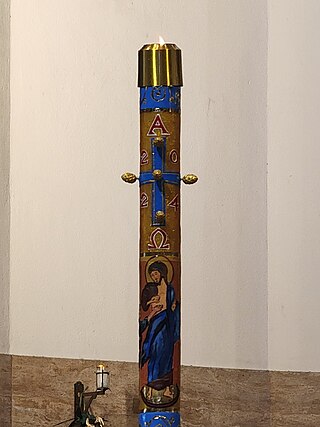
A Paschal candle is a large candle used in liturgies in Western Christianity. A new Paschal candle is blessed and lit every year at Easter. It is used throughout the Eastertide and then throughout the year on casualities such as baptisms, funerals and some other special occasions such as the ordination of priests, taking vows or the Consecration of virgins, when the fire from the Paschal candle is carried with a wick to light another liturgical candle, as for example the baptismal candle.
The son of perdition is a phrase associated with a demoniacal title that appears in the New Testament in the Gospel of John 17:12 and in the Second Epistle to the Thessalonians 2:3.
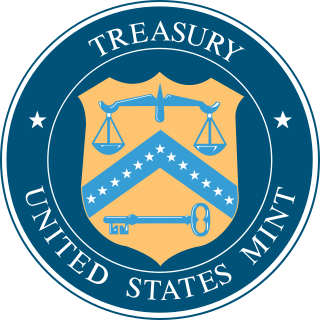
The United States Mint is a bureau of the Department of the Treasury responsible for producing coinage for the United States to conduct its trade and commerce, as well as controlling the movement of bullion. The U.S. Mint is one of two U.S. agencies that produce money in the case of minting coinage; the other is the Bureau of Engraving and Printing, which prints paper currency. The first United States Mint was created in Philadelphia in 1792, and soon joined by other centers, whose coins were identified by their own mint marks. There are currently four active coin-producing mints: Philadelphia, Denver, San Francisco, and West Point.

In the Biblical Book of Judges, Jair or Yair was a man from Gilead. He was of the Tribe of Manasseh and also descended from the Tribe of Judah. Jair judged Israel for 22 years, after the death of Tola, who had ruled of 23 years. His inheritance was in Gilead through the line of Machir, the son of Manasseh.
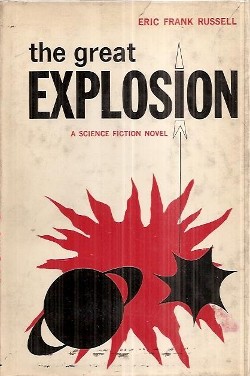
The Great Explosion is a satirical science fiction novel by English writer Eric Frank Russell, first published in 1962. The story is divided into three sections. The final section is based on Russell's 1951 short story "...And Then There Were None". Twenty-three years after the novel was published, it won a Prometheus Hall of Fame Award.

The lesson of the widow's mite or the widow's offering is presented in the Synoptic Gospels, in which Jesus is teaching at the Temple in Jerusalem. The Gospel of Mark specifies that two mites are together worth a quadrans, the smallest Roman coin. A lepton was the smallest and least valuable coin in circulation in Judea, worth about six minutes of an average daily wage.

Professional Coin Grading Service (PCGS) is an American third-party coin grading, authentication, attribution, and encapsulation service founded in 1985. The intent of its seven founding dealers, including the firm's former president David Hall, was to standardize grading. The firm has divisions in Europe and Asia, and is owned by parent company Collectors Universe. PCGS has graded over 42.5 million coins, medals, and tokens valued at over $36 billion.

The post-tribulation rapture doctrine is the belief in a combined resurrection and rapture, or gathering of the saints, after the Great Tribulation.

The chain cent was America's first large cent and the first circulating coin officially produced by the United States Mint. It was struck only during 1793.

John 18 is the eighteenth chapter of the Gospel of John in the New Testament of the Christian Bible. This chapter records the events on the day of the Crucifixion of Jesus, starting with the arrest of Jesus the evening before. The three denials of Peter are interwoven into the narrative concerning the trials of Jesus.
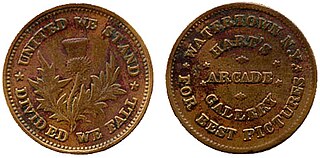
Civil War tokens are token coins that were privately minted and distributed in the United States between 1861 and 1864. They were used mainly in the Northeast and Midwest. The widespread use of the tokens was a result of the scarcity of government-issued cents during the Civil War.

The 1 euro cent coin (€0.01) has a value of one hundredth of a euro and is composed of copper-covered steel. It is the lowest-value coin in the Eurozone; the next highest are the 2 and 5 euro cent coins. All euro coins have a common reverse and a country-specific (national) obverse. The coin has been used since 2002 and was not redesigned in 2007 as was the case with the higher-value coins.
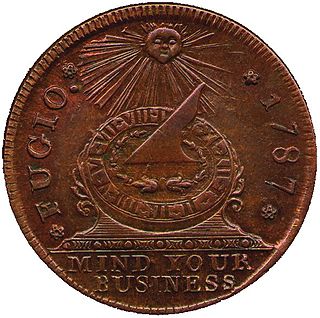
The Fugio cent, also known as the Franklin cent, is the first official circulation coin of the United States. Consisting of 0.36 oz (10 g) of copper and minted dated 1787, by some accounts it was designed by Benjamin Franklin. Its design is very similar to Franklin's 1776 Continental Currency dollar coin that was produced in pattern pieces as potential Continental currency but was never circulated.
Mind your own business is a common English saying. It may also refer to:
Mind your business may refer to:

Ephesians 1 is the first chapter of the Epistle to the Ephesians in the New Testament of the Christian Bible. Traditionally, it is believed to have been written by Apostle Paul while he was in prison in Rome, but more recently, it has been suggested that it was written between AD 80 and 100 by another writer using Paul's name and style. This chapter contains the greeting, followed by a section about "The Blessing of God" and Paul's prayer.

1 Timothy 6 is the sixth and final chapter of the First Epistle to Timothy in the New Testament of the Christian Bible. The author has been traditionally identified as Paul the Apostle since as early as AD 180, although most modern scholars consider the letter pseudepigraphical, perhaps written as late as the first half of the second century AD.
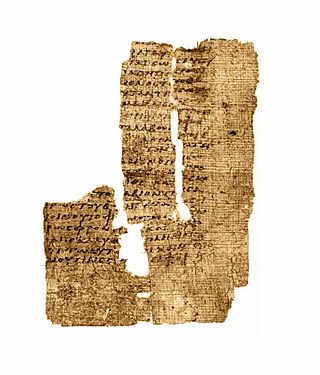
Philippians 4 is the fourth and final chapter of the Epistle to the Philippians in the New Testament of the Christian Bible. It is authored by Paul the Apostle about mid-50s to early 60s AD and addressed to the Christians in Philippi. This chapter contains Paul's final exhortation, thanks for support and conclusion of the epistle.

The Continental Currency dollar coin was the first pattern coin struck for the United States. The coins, which were designed by Benjamin Franklin, were minted in 1776 and examples were made on pewter, brass, and silver planchets.
References
- ↑ "Bible Gateway passage: 1 Thessalonians 4:11 - New King James Version". Bible Gateway. Retrieved 2022-09-01.
- ↑ "1 Thessalonians 4:11-12 NIV". biblegateway.com. Retrieved 2012-03-26.
- ↑ "Fugio Cents - PCGS CoinFacts". PCGS. Retrieved 2023-04-29.
- ↑ Palmatier, Robert Allen (1995). Speaking of Animals: A Dictionary of Animal Metaphors. Greenwood Press. pp. Google Books Search, p.23. ISBN 0-313-29490-9.
- ↑ "mind your own beeswax". Theidioms.com. 2006-01-16.
- ↑ "World Wide Words: Mind your beeswax". World Wide Words.
- ↑ "'And Then There Were None' by Eric Frank Russell". www.abelard.org.